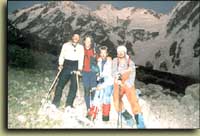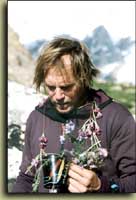These words don't describe a formal meeting and they are not part of a grant application.
These are genuine opinions of people who have worked with Carlos in the mountains, have
become very close to him and are planning some future activities together. |

Team of summiters. From left to right: Ivan Dusharin, Carlos Buhler, Andrei Mariev,
Alexander Dosaev
|
|
Volkov: "There is no permanent team he works with in the U.S. This is surprising to
us. He's been climbing for nearly 30 years and does not have his own team. I think this is
more of a Russian thing - working in teams. I can't even imagine myself changing teams and
partners each year. It's beyond my imagination. Actually a team is necessary for our
expeditions. A team and an expedition are really equal things for us. For Western mountain
climbers, maybe it is normal to switch the team one climbs with. |
This kind of mountaineer has to work in a new team with unknown people on a regular basis.
So their actions are always rationally organized and they tend to work more for themselves
and care more about their own safety and comfort. It is very unusual and not always
pleasant for us to watch such people. For example, when Carlos is on the route, he reaches
the tent. There are three of us there. Everybody is frozen and Carlos starts cooking and
eating. It's okay to take some food from him and eat, too. But nevertheless, he cooks as
if just for himself.
How do we do it? First, we discuss what kind of soup we are going to prepare. There are
only two varieties, but we need to discuss it together! We say: we have to cook this
first, then that, and that, and that. Carlos does everything as if he were a diesel bus.
He explains that it is necessary to get calories. This is a professional attitude, too.
Sometimes we are too picky about our food... "it's not tasty" or "I don't
wanna." He eats everything and anything that is edible."
Dusharin: "He has his own opinion about comfort. In the base camp, he had a
well-equipped tent. There was music there. He took a computer, a satellite phone, books,
richly illustrated editions, and photos of his wife and family. He never hurries to start
the climb, like we do. He didn't go to the first camp with us to acclimatize. He preferred
to wander around base camp and get some rest. (Perhaps this was also influenced by his
mother having just died in the United States a few days earlier.) He didn't try to avoid
climbing, but he never created situations where you had to hurry things or stay on a fixed
schedule. Perhaps it is his culture, even though it irritates us sometimes. After all, we
unintentionally aim for a goal, and expect to work hard. But he always tries to find the
easiest way to get the result he wants.
We had some misunderstandings because of this difference in approach. In the early stages
of the climb, we discussed a problem with him one morning in Camp One. The question was
whether it was wise to start fixing ropes up a broad snow and ice couloir since the
weather had been bad during the night. The weather had not been stable at all. From our
point of view, the conditions were good enough to do the work. It was snowy, windy, and
foggy, but that didn't matter to us. We thought it would clear up soon, and we didn't want
to lose any time. But he was in doubt, shook his head and refused to start. We spent more
than two hours discussing the weather. (This was a feat in itself, since he speaks only
broken Russian, and our English was nonexistent.) He never asked us to go back down with
him. He just said: "I think, I'll go back down." So we were not moving up
anymore that day. Late in the morning, we descended to base camp. Everybody (including Ali
Madat, our cook) was surprised. In the end, the weather got better by evening and we back
up the mountain."
Volkov: "Carlos has his own, so to say, methodology. He comes to the mountains and
starts working according to his own personal orientations, methods, and schedule. And he
doesn't pay much attention to others. He says: 'I'm just made this way.'
Their school is so much different: they all make decisions themselves and are very
independent in their actions. It is vice versa in Russian climbing: decisions are the
products of a discussion and it is necessary for everyone to follow them. And what was the
thing with Carlos? We just had set an agreement and after half an hour the situation
changed. Carlos said: 'I'm changing my mind.' But we are moving together, aren't we? He
said, 'Have it your way, but I'm going back.' 'I'm going back!' That's unthinkable for us.
I say, 'Ivan, should we go back too? Let's talk to Andrei. Let's wait for others. Maybe we
can work something out.' And Carlos says, 'I'm going back.' So, you can really notice a
difference between these two approaches." |
Dusharin: "He is very attentive to things around him. For example, if Carlos ascends
ahead, he would care about being the only person using the rope at the time. It is wise
from the security point of view. We follow him, walking a little bit faster. And we have
to wait for him to leave the rope free. Sometimes two or three people get on one rope. He
notices this and starts understanding something. Once he reached the snow slope and stood
near the big stone to wait for us. We stopped to have a rest and to wait for him to start
moving. Then he said, 'Go, Andrei!' Andrei went. Then he said the same to Sasha. I said,
'Carlos, you go!' But he didn't. I went. He noticed that he is holding us back, that we do
not move at our own pace trying not to impede him. He reacted instantly. |

Carlos Buhler after the summit with a wreath on his neck
|
|
He is a considerate person, and there is a reason for that. He was always trying to pick a
partner from us, not even to go to the summit, but to the next section of the route, and
to bivouac with. He tried to arrange so that it looked like our own choice. He never
insisted, but everything was clear."
Volkov: "If he notices that an important decision can be made without his
interference, he would not interfere anyway. He would just use the things others make. It
happens not because of misunderstanding. And it's not because he cares about his energy or
so. It's just his ideology.
Sometimes he was really funny. For example, when I came to Nanga Parbat he said, 'I don't
understand how five of them can fit into one tent!' It would be OK for us to fit five
people into one tent. But his professional and cultural experience don't let him stand
such inconveniences. So he went into another tent (the Japanese one), he planned his
actions so that he didn't have to sleep in the tent where four people were already. He
tried to persuade Andrei Mariev to separate from the others, to break in groups. He
performed a bunch of actions just in order not to sleep in such a crowded tent!" |
|
